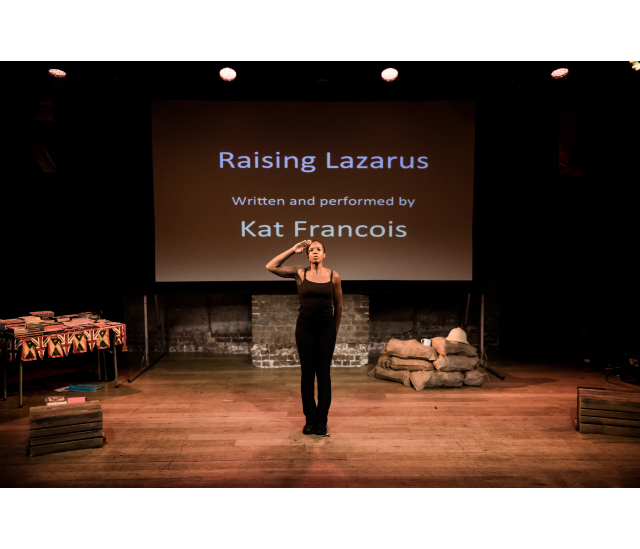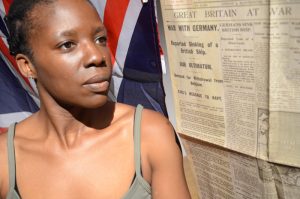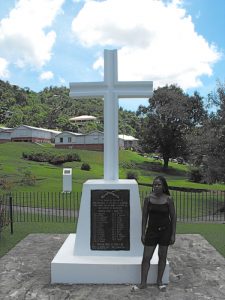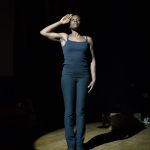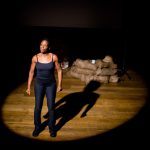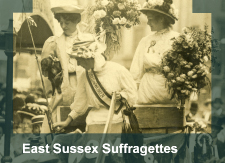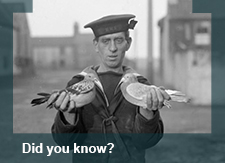Upon discovering that Kat Francois had a West Indian relative in World War One (WW1) who had once been stationed in Seaford, she began the process of writing Raising Lazarus, a play about that very subject.
They said goodbye to Caribbean soil,
They said goodbye, family friend and foe,
They said goodbye burnt mangoes,
Ripe and moist from the sun so warm,
They said goodbye mother
They said goodbye father
They said goodbye to their children still small.
They said goodbye to their children so small.
They said goodbye clear blue skies,
They said goodbye Tamarind tree,
Full of fruit, sharp and sweet
They said goodbye to the bright sunshine,
They said goodbye to lush green earth,
They said goodbye to their place of birth.
They said goodbye, they said goodbye, they said goodbye.
“GOODBYE.” poem by Kat François, written for the play Raising Lazarus.
I am British born. Both my parents were born in the Caribbean on a tiny Island called Grenada, which is only 12 miles wide and 21 miles long.
This story is about my mother’s side of the family.
My gran came to England in the fifties seeking her fortune and a better life for her children that she had to leave behind.
My mum joined my gran in England as a 14 year old and, like all migrants, had to learn a new culture, a new way of talking and even a new way of walking.
My gran and mother grew up in a tiny village called River Sallee in the Parish of St Patricks. My family has lived in that very village, as far as we know, since slavery times. This is where the hero of my story was born and raised, but before I talk about Lazarus François, let me set the scene.
I had no interest in history as a child, could just about keep my eyes open during history lessons, especially around the First World War, which seemed so far removed from me.
In my lessons there was no mention of Caribbean soldiers or any of the other commonwealth countries, so the information flew over my head like a London pigeon and kept flying.
In 2009 I decided it was time to take a trip to Grenada. I had been a few times but my partner hadn’t, so we decided to book a holiday. He bought a book called “Grenada, A history of its people.” by Beverley Steele. Whilst reading, my partner came across a picture of a memorial in St George’s, the capital of Grenada, and he asked me if I had a relative called Lazarus François who had fought in WW1. I, of course, said no! I had never heard of this Lazarus François and being the nosey one in the family who knows everything about everyone, my first thought was that if I did not know about him he could not be related to me.
It did niggle at me though so I asked my mum. She said she had never heard of him but she encouraged me to speak to my gran who she said was a wealth of family information.
So I paid my gran a visit and that was when the whole of this journey started because she said yes, that Lazarus was related to us, that he was her father’s (my great grandfather) first cousin, and that my great grandfather and Lazarus were best of friends. That in fact my great grandfather had tried to sign up to join the British army along with his cousin Lazarus but was turned down due to the fact he had so many dependents!
Well what can I say, my mind was blown. I, little old Kat François, was related to Lazarus François, a WW1 soldier.
It’s been six years since that revelation and, with the help of my partner, we have researched and hunted, and read and searched for as much information as we possibly could about Lazarus and Caribbean solders in WW1.
The search goes on, as information has not been easy to come by.
The opportunity to create a play came from a writing lab held by the Theatre Royal Stratford. In 2010 the play was originally directed by Dawn Reid, and has gone on to be performed nationally and internationally from Nottingham Playhouse, Roundhouse, Richmix London, to Canada, South Africa, and Australia.
At first I was quite intimidated by Lazarus’ story. I was not sure if I had the right to tell it or share his story and the thought of all the research needed was also intimidating, to be honest. in the beginning. I did not know where to start.
Luckily my other half had previously investigated a great uncle of his, Uncle Bert, who died at High Wood during the Battle of the Somme, 1916, so he knew where to start searching and ended up becoming a researcher on the play. This made the task a lot less daunting and therefore manageable. Sadly we found that information on the British West Indies Regiment was not always easy to come by but we were able to piece together Lazarus’ life with what information we did find.
I guess you could say my play Raising Lazarus has been a slow burner for me, at first I did not appreciate the importance and significance of his story and the story of others like him and why it was important for me to share it.
This soon changed when every time I performed the play, the reaction I received helped to steel my resolve, the positive reactions made me realise that I did have a right to tell his story and the stories of Caribbean soldiers which have been forgotten. Not only did I have a right but as performer/poet/playwright and descendent of a WW1 solider, it was my duty.
Some of the most memorable performances I have had have been in front of family. I performed Raising Lazarus in Sydney, Australia earlier this year, a performance that was attended by my elder sister, who had yet to see the play. It was a special moment to bring my family history to such a faraway place, yet have such a personal connection in the audience. I can’t lie a few tears were shed at the end.
- Kat François performing Raising Lazarus
- Kat François performing Raising Lazarus
- Kat François performing Raising Lazarus
There was also a performance at Nottingham Playhouse in front of 10-11 year olds, who reacted so well, and afterwards had so many questions and who were eager to share their own family histories with me. This proved to me how important it is to share the knowledge I have and I encourage others to seek out their own family histories. That performance also showed that there was scope for Raising Lazarus to be presented to a younger audience and I have subsequently created a 45-minute version with accompanying workshops and supportive teaching materials for schools.
Later in the year Raising Lazarus will hopefully be performed in the village of River Sallee, Grenada, where Lazarus François was born and, as previously mentioned, where my family goes back for generations.
I will have the very remarkable and important opportunity to share the play with family who still live there and that will be a very special and touching moment. A chance to take his story back home.
I am now passionate about history and telling stories that shed light on those who have been forgotten. I am passionate about weaving history into palatable tales which audiences can relate to. This is the same person who daydreamed her way through history lessons in school, if my history teacher could see me now! The irony is too glaring to ignore.
As an artist, I look at it as my job to create art, which everyone can relate to, to present history in a palatable and respectful manner, which can hopefully elicit laughter, tears and ultimately inspire those who see Raising Lazarus to research their own family histories.
I am excited to bring Raising Lazarus to Brighton Festival and look forward to sharing my work with a new audience, particularly as nearby Seaford played such an important role for Lazarus and soldiers of the British West Indies Regiment, before being deployed to conflict zones.
So many more stories to tell,
So many voices unheard,
So many memories hidden
Fighting to see the light of day,
Time to blow oxygen back into deflated lungs
Time to reinstate, re- invigorate,
So many of our boy’s suffered and sacrificed,
In the King’s name.
So many forgotten names, so many pains,
So many footsteps yet to be uncovered,
Love, tragedies, and triumphs,
Old bones crying to be reclaimed,
Families reunited,
Over time and distance,
Fallen soldiers of all nations deserve to be upheld,
Our boy’s travelled far and wide,
England, France, Kenya, Egypt, Mesmatania, Palestine,
They should not be forgotten
They should not sink into oblivion,
They should not be ignored
Their courage and efforts denied
They should not be whitewashed from history.
So let’s scatter historical seeds,
Which will plant and sow
And spread and grow
Dispersing new wartime stories.
So many more stories to tell,
So many voices unheard,
So many memories hidden
Fighting to see the light of day.
“SO MANY STORIES TO TELL.” Poem written by Kat François for her play Raising Lazarus.
Raising Lazarus will be performed at the Attenborough Centre for the Creative Arts on the 9th and 10th May 2017. Tickets are available here.
This story was contributed by Kat François and Robert Covell

